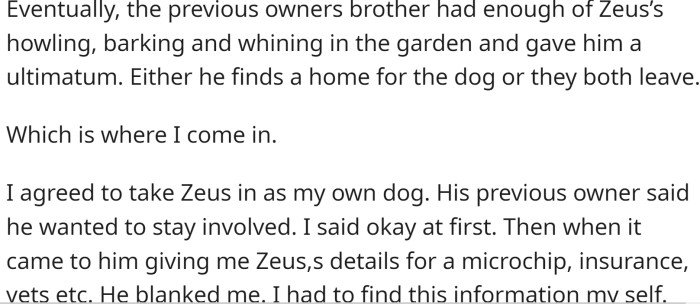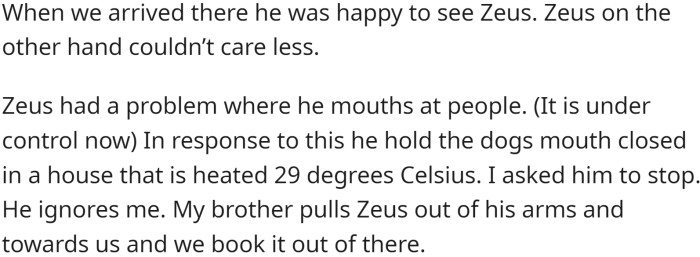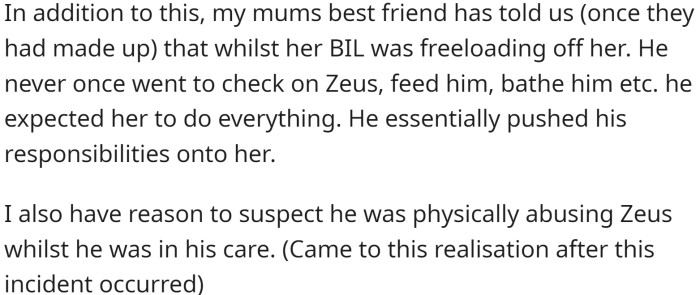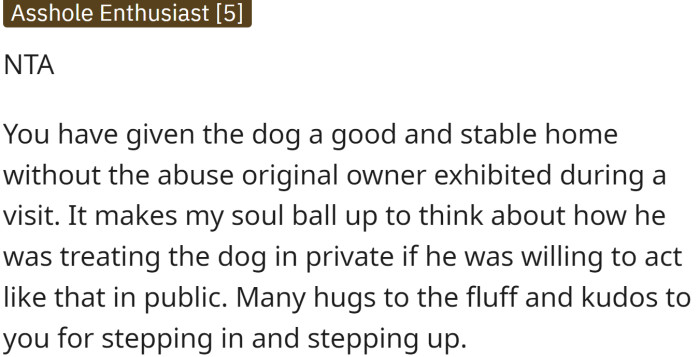Redditor Refuses To Let Their Dog’s Previous Owner See It Because Of The Maltreatment It Suffered In The Past
OP has a dog that he got from a friend. The dog's previous owner was living with his sister-in-law and brother.
His brother already had two dogs from the same litter and his own dog, and they were constantly fighting, as Akitas are prone to same-sex aggression, regardless of family relations. But that was only part of the problem.
The dogs were generally maltreated, and they needed help. OP agreed to take Zeus in as their own dog. His previous owner said he wanted to stay involved.
OP said okay at first. “Then, when it came to him giving me Zeus’s details for a microchip, insurance, vets, etc., he blanked me. I had to find this information myself.”
Things went very well for Zeus and his new family: “After a couple of weeks of having Zeus, he began to trust my family and me. He was absolutely smitten with my brother. He’d follow him to the ends of the earth. It’s really adorable.”
It was all fine until OP received a call from Zeus’s previous owner. He wanted to meet him. OP said no, but his mom told him that was mean and that they should allow the meeting.
So, OP arranged a meeting. “When we arrived there, he was happy to see Zeus. Zeus, on the other hand, couldn’t care less.”
He even started barking at the previous owner. It was clear that there was no connection there...
Still, the previous owner wanted another meeting. Read the full story below:
OP asks:

OP has a dog that he got from a friend. The dog's previous owner was living with his SIL and brother.

His brother already had two dogs from the same litter and his own dog, and they were constantly fighting, as Akitas are prone to same-sex aggression

Understanding Attachment and Ownership
Attachment theory explains how early relationships shape our bonds with others, including pets. Dr. Mary Ainsworth's research on secure and insecure attachment styles illustrates how an individual's past experiences with caregivers can influence their current relationships with animals.
In cases of pet ownership, this attachment can lead to protective instincts, especially when a pet has experienced maltreatment, which can evoke strong emotional responses from their new owner.
Understanding Animal Attachment and Ownership
The bond between pets and their owners can be profound, often reflecting deeper psychological needs for companionship and unconditional love. Research published in the Journal of Applied Animal Welfare Science indicates that pets serve as emotional support, helping to alleviate feelings of anxiety and loneliness.
When a pet has been mistreated, the emotional scars can run deep, not just for the animal but also for those who care for it. This situation highlights the importance of recognizing the psychological trauma that animals can experience due to neglect or abuse.
OP agreed to take Zeus in as their own dog. His previous owner said he wanted to stay involved.

His previous owner said he wanted to stay involved. OP said okay at first. “Then, when it came to him giving me Zeus’s details for a microchip, insurance, vets, etc., he blanked me. I had to find this information myself.”

Zeus was not happy to see his previous owner

A clinical psychologist specializing in animal behavior notes that the bond between humans and dogs can be incredibly powerful. Studies show that pets often serve as emotional support systems, enhancing their owners' well-being.
When a pet has suffered maltreatment, the new owner may feel a heightened sense of responsibility to protect them from further harm, reflecting their own emotional investment in the pet's recovery.
Dr. John Paul Scott's work on animal behavior emphasizes that animals can form attachment styles similar to humans. When a dog has experienced maltreatment, it may develop anxious or avoidant behaviors that complicate its reintegration into a new home.
This highlights the ethical considerations involved in reuniting a pet with a previous owner who has a history of maltreatment; doing so could potentially exacerbate the animal's trauma.
But the owner wanted another meeting

Mom said no, and all hell broke loose

OP has offered the following explanation for why they think they might be the a-hole:

Navigating Ethical Dilemmas
The ethical considerations surrounding pet ownership can be complex. Research published in the Journal of Animal Ethics suggests that individuals often grapple with feelings of loyalty to former owners versus their commitment to the well-being of the animal.
In such scenarios, it can be helpful to focus on the pet's current needs rather than past ownership dynamics, understanding that the priority should be the animal's safety and happiness.
Ethical Considerations in Pet Ownership
Deciding whether to allow a previous owner access to a maltreated pet raises significant ethical questions. According to animal welfare experts, it’s crucial to prioritize the animal's psychological well-being over human desires.
Research indicates that animals subjected to abuse often require stable and loving environments for recovery, which may not include returning to previous owners. The ethical principle of 'do no harm' should guide decisions about pet ownership and custody.
This Redditor thinks OP should report animal cruelty

OP replied:

"This man clearly abused this dog"

Incorporating a compassionate perspective can facilitate healthier decision-making. Engaging in discussions with others who understand the emotional stakes can provide clarity and support.
Pet owners may also benefit from reflecting on their motivations, asking themselves what the best outcome for the animal truly is.
Pet owners can benefit from understanding the psychological impact of trauma on their animals. Behaviorists suggest that integrating positive reinforcement training can aid in rehabilitating pets that have suffered maltreatment.
This approach not only helps the animal develop trust but also fosters a bond between the pet and its new owner. Research has shown that animals trained with positive reinforcement exhibit improved emotional well-being and recovery outcomes.
OP has every right to change decision to keep contact with previous owner.

OP has given the dog a good and stable home

No need to expose the dog again

The Role of Empathy in Animal Care
Empathy plays a crucial role in the way we respond to animals in distress. Studies indicate that individuals who have strong empathetic traits are more likely to advocate for the needs of pets and recognize their suffering.
This emotional connection underscores the importance of fostering empathy not only toward animals but also within ourselves, as it can guide our decisions in complex situations.
The Role of Empathy in Animal Care
Empathy plays a crucial role in how we approach animal care. Studies show that individuals who demonstrate high levels of empathy toward animals are more likely to engage in responsible pet ownership and advocacy for animal rights.
Dr. Christine Overall, a noted bioethicist, emphasizes that our moral obligations to animals extend beyond simple ownership; they require an understanding of the animal's needs and history.
Empathy can lead to better decision-making regarding an animal's future, ensuring their well-being is prioritized.
Our pets rely on us to keep them warm, healthy, and fed. However, they also need love.
And sometimes, that's the most important thing. However, some pet owners forget that.
They think that a nice bed and high-quality food can make up for quality time. Once their illusions shatter, they often give their pets away.
They think that if someone else takes care of the logistics, feeding, cleaning, etc., they will be left with quality time.
But it doesn't work that way. Pets get attached to the person who takes care of them.
In situations where a previous owner wishes to reclaim a maltreated pet, it’s essential to assess their motivations. Clinical psychologists suggest that individuals who have shown a pattern of maltreatment may not fully grasp the emotional needs of the animal, potentially leading to further harm.
Engaging in conversations that explore the previous owner's understanding of animal welfare can provide insights into whether they are genuinely committed to change.
Rehabilitation Strategies for Maltreated Pets
Rehabilitating a maltreated pet requires patience and understanding. Animal behaviorists recommend a gradual approach, allowing the pet to acclimate to its new surroundings at its own pace.
Creating a safe space for the animal can foster a sense of security, which is vital for building trust. Research indicates that environments enriched with positive stimuli help reduce anxiety and promote healing in traumatized animals.
Ultimately, the decision about whether to allow a previous owner access to a maltreated pet should be guided by the best interest of the animal. Balancing compassion for the previous owner with the need to protect the animal's well-being is a delicate task that requires careful consideration.
By prioritizing the psychological health of the pet, we can ensure that our actions lead to a more positive outcome for all involved.
Psychological Analysis
This situation exemplifies the profound emotional connections humans can form with animals, often leading to protective instincts. In this case, the refusal to let the previous owner see the pet stems from a deep concern for the animal's well-being, reflecting a keen awareness of the impacts of maltreatment. It's vital to recognize that prioritizing the pet's mental health is paramount in these circumstances.
Analysis generated by AI
Analysis & Alternative Approaches
In conclusion, the complexities surrounding pet ownership and past maltreatment highlight the need for empathy and ethical considerations. Understanding the psychological dynamics at play can lead to better choices regarding the care and custody of animals.
It's essential that we prioritize the emotional well-being of pets, ensuring they have safe and loving environments where they can heal and thrive.
Moreover, understanding the psychological effects of trauma on both pets and their owners can deepen this empathetic response. Research shows that animals can exhibit signs of PTSD-like symptoms after experiencing abuse, which parallels the emotional challenges faced by their new owners.
Recognizing these patterns can enhance the bond between the owner and the pet, promoting healing for both parties.
Practical Steps Forward
One practical approach for individuals in this situation is to establish a pet care plan that prioritizes the animal's welfare. This plan can include consulting with veterinarians or animal behaviorists to ensure that the best practices are followed for rehabilitation.
Additionally, involving a support system of friends and family can provide emotional backing and encouragement as the new owner navigates this complex emotional terrain.
Analysis & Alternative Approaches
Ultimately, the relationship between humans and their pets is profoundly influenced by empathy and understanding.
By focusing on the needs of the animal and fostering open communication about ethical concerns, pet owners can cultivate a nurturing environment that supports healing.



